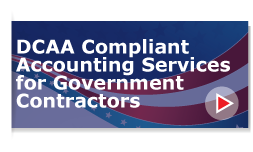
Small businesses are critical to the economy of the United States. Their performance as innovators and job creators consistently outperforms their larger corporate counterparts. In fact, in the post-recession years spanning mid-2009 to mid-2013, approximately 60 percent of net new jobs were created by companies with fewer than 500 employees. The federal government is committed to supporting small businesses, taking steps to ensure that contracts are awarded to companies of all sizes, not just major corporations.
One of the most critical regulations requires each federal agency to meet certain goals when distributing work. For example, 23 percent of prime contracts must be awarded to small businesses, and 5 percent of prime and subcontracts must be awarded to small businesses owned by women. However, qualifying for a government contract demands more than simply meeting demographic requirements.
Defense Contract Audit Agency (DCAA) for Small Businesses
All government contractors, including small businesses, must comply with specific accounting practices. The task of validating compliance is handled by the Defense Contract Audit Agency (DCAA). The Agency is responsible for conducting pre-award surveys and audits of any business contracted by the federal government, and it is specifically focused on the company’s ability to meet Federal Acquisition Regulations (FAR).
DCAA auditors will confirm that each contractor meets requirements related to the following:
- Business systems
- Management policies and procedures
- Accuracy and reasonableness of contractors' forward-pricing and incurred-cost representations
- Adequacy and reliability of records and accounting systems
- Contractor compliance with contractual provisions having accounting or financial significance
Failure to comply with DCAA standards comes with severe penalties, which may include suspension of payments and ineligibility for future government contracts, and the process is becoming far more stringent. At one time, contractors were scored on a range, and the DCAA offered recommendations to bring accounting methods into full compliance. Today, assessments and audits are completed on a pass/fail basis, leaving little room for error.
Meeting DCAA Pre-Award Requirements
Some small businesses invest in costly specialized accounting programs to ensure DCAA compliance, but in many cases, this expense is unnecessary. A thorough understanding of DCAA requirements may be enough for qualified accountants, controllers and bookkeepers to create and maintain appropriate records with standard accounting programs.
Your business must take that into consideration these major pre-award requirements:
- Direct costs versus indirect costs must be properly segregated. For example, wages paid to produce goods to fulfill the contract are direct costs, while wages paid to manage the business as a whole are indirect costs. Indirect costs must be equitably and consistently applied to all of the company’s contracts. The accounting system must be capable of accumulating costs by contract, which is typically referred to as a job order cost accounting system.
- All books of account, including the relevant job order cost accounting system, must roll up to and reconcile with the general ledger system.
- Proper allocation of labor to contract-related activities, specifically, the time-keeping system in place, must be capable of separating activities related to different contracts. Note the special importance of contractors creating timekeeping policies and procedures, and then ensuring employees adhere to these guidelines to guarantee accurate labor records.
- Costs charged to a contract must be updated regularly. At a minimum, all accounts should be reconciled at least monthly, and appropriate reports produced.
- Costs that can't be charged to the government must be appropriately segregated. Examples include entertainment and contributions or donations.
- The company must have the ability to allocate costs to specific units or line items if needed.
- The company must separate pre-production costs from production costs.
The DCAA offers a Pre-Award Accounting System Adequacy Checklist that covers all of these points to assist small businesses in preparing for an assessment.
DCAA Price Proposal Documentation Requirements
Regulations require all proposals to include certain information so decision-makers can accurately compare costs associated with the project. A complete proposal must contain a detailed analysis of the labor and overhead rates used to create the final proposal, along with historical data related to these expenses and the method used to project future expenses.
If the DCAA elects to audit your business, be prepared to produce documentation supporting the data included in the proposal. You must have all of the following items:
- Documentation supporting the labor rates listed
- Documentation supporting the cost of materials, broken down by contract line items. Examples of documentation could include competitive bids, vendor quotes and similar.
- Documentation supporting any indirect costs listed, including the method used to assign portions of the indirect costs to the contract in question
A copy of the Contract Pricing Proposal Checklist is available to small businesses for easier preparation of appropriate price proposals.
Compliance with federal contractor accounting requirements doesn’t have to be a financial hardship, and the DCAA has made every effort to provide small businesses with the tools needed to be successful. For example, the ICE (Incurred Cost Electronically) Model and EZ-Quant Applications used by the agency can be accessed online. With careful attention to the regulations and an affordable accounting system, small businesses can comply with the standards that govern federal contractors.
Does your company need DCAA compliant accounting? Learn how we support small government contractor accounting needs.














